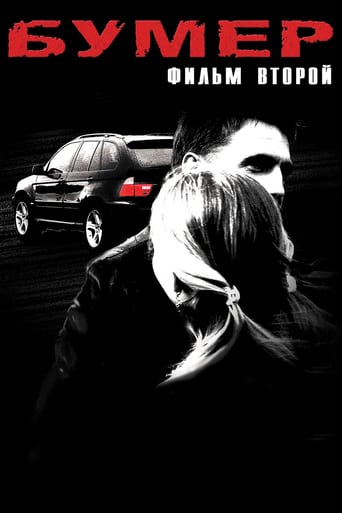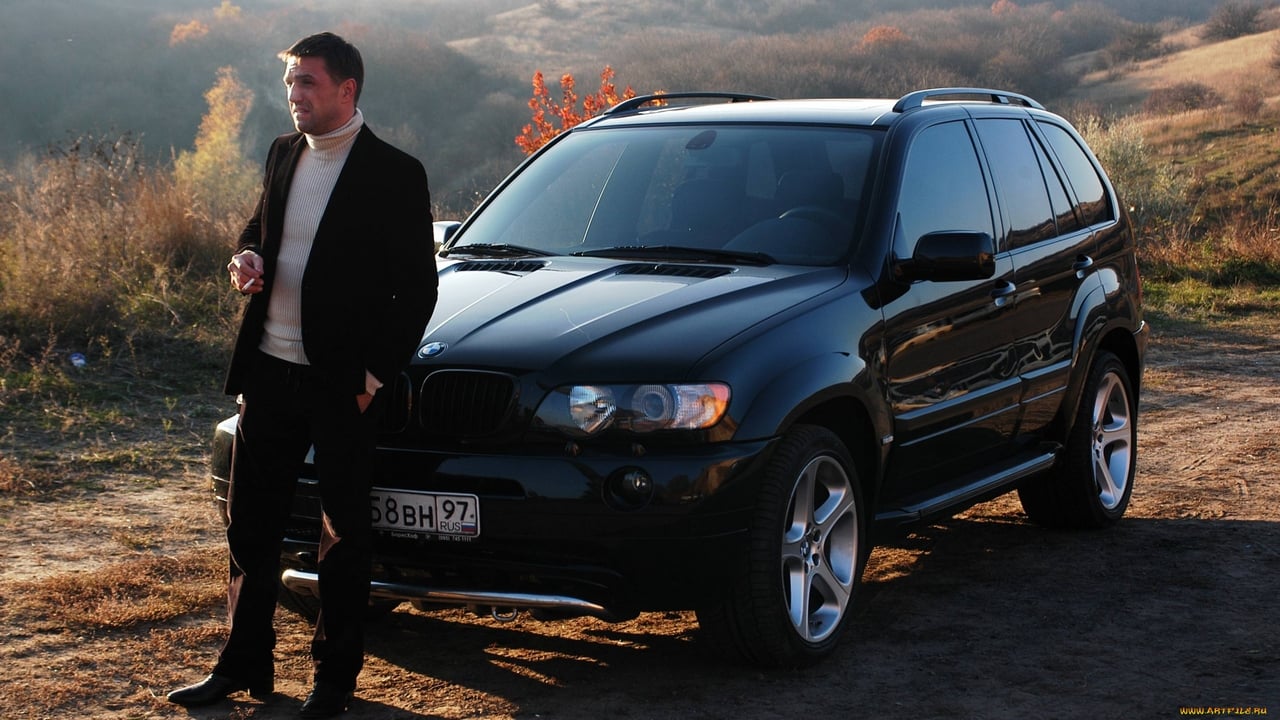Tgrain
Sequels are always a dilemma for directors, it's very easy to miss and Buslov gets a lot of credit for moving straight into a sequel as his next feature project.Instead of returning to the same old story twice, Buslov wisely chose to make the story about redemption and effectively introduced a new lead in the form of Dasha, a girl that seems fated to repeat the footsteps of Kostya's gang and played masterfully by Svetlana Ustinova. The story is sufficiently realistic, though he takes a few more chances than with the original there are no holes or dilemmas that would irritate. Casting is very high caliber and the music doesn't fail to deliver again. Cinematographically Buslov evolved to a slightly faster paced style, there is less moving camera than with the original Boomer (something I personally enjoyed), but close ups are very effectively utilized. On the other end, one or two sequences are overextended time wise, but not to the point of irritation. Note: unlike with the Brother films of Balabanov, it does help to see Boomer 1 prior to watching this film.
Some One
While Bumer 1 was a trivial gangster movie with not much substance, Bumer 2 (or Heaven on Earth) is a mark of a genius. It is very subtle and to an unsuspecting viewer it may seem not much. There is a plot but not much action: no flying bullets, no blood and no revenge.Nevertheless, today I watched it for the third time and it was even better then the first two. Do you have to be familiar with the Russian culture to understand it? Not really. If you ever felt like the system's got you or if you felt like there is no way out - you'd get it, I promise.One of my favorite movies so far.
k1001bg
====minor spoilers ahead====*I apologize for the length of this review, but reading so many inadequate comments on this movie provoked me to be a bit more verboseSwimming against the current is pretty much what Pyotr Buslov does with his second Bumer movie. It makes it twice more admirable that he does it against the current he himself helped create.Beginning from Brother (1997), the Russian cinema produced a myriad of gangster flicks, which contained great amount of gore and blood, several memorable anti-heroes, and ultimately very little criticism of a reality so fundamentally flawed, that to a westerner's eye it appeared as cartoonish and unrealistic, as say the reality presented in Bekmambetov's Nightwatch universe.Bumer (2003) was different, but too few people realized it. It had plenty a shiny metal, guns, girls and blood to mask itself well. But to a careful eye, it somehow didn't match. To begin with, the gangsters were running away, they were being hunted and endangered, but not by other gangsters, or crooked politicians or even ex-KGB agents, but by the same marginal characters that so often appear to be the victims in contemporary Russian cinema - truck drivers, drunk cops, villagers. In fact at one point even an old babushka managed to scare them. Contrary to the established existential model in which a gangster starts out small and poor and struggles to the top of the food chain with all means possible, in his first movie Buslov did something completely different. As the four friends were running away, the world itself became rougher and darker, up to the point when it consumed them all, together with the BMW.While the first film relied on certain quantity of raw violence to attract attention, the second conveys Buslov's real message in a much more artistic way.All begins with a flashback of the first movie's ending. Fast forward four years. Two of the four are dead, who they were matters no more to those who survived. Notably the introduction remains the most violent scene in the whole movie. From then on lyricism slowly begins to take over from the violence as Buslov's main expressive tool. Kostya is getting released from prison but his past is done. There is no vengeance , no scores to settle. There is no empire to build. Vladimir Vdovichenkov pulls out another awesome performance as the wandering Kostya. Already vanishing in the first movie, the cocky, violent thug has now completely disappeared, and instead an ordinary man who's accepted the loss of all and simply wants to live the rest of his days on his own, away from everything has emerged. But along comes Dasha, a teenage criminal with a plan and at one point the journey ahead somehow becomes too easy. Drive far enough, buy tickets, reach paradise. But Kostya can't go to paradise. He's too old, he's seen and done too much. They don't let people like him in paradise. It is this realization that ultimately helps Kostya make a decision that redeems him and lets him find his own "paradise on earth".Early in the movie Dimon makes a very interesting statement. The times are changing, says he to Kostya, but we learn very quickly that under the surface, this is not the case. Some things can never change. Thus, trying to change things in general might not be what is essential. Instead, changing one person might be all it takes."I'm uncertain of what I'd have done in your place then" says Kot to Dimon at one point, but at the end he knows. I read someone complain of the sad ending. The concept of the movie would have not have worked without it.Despite what she does, Dasha is still a child, an Buslov tries very hard to make this point. There are no sex or nude scenes (in fact not even a kiss) with her in the movie. While Kostya's life is pretty much over at the beginning of the movie ("Tell your children to live better lives than we did" says he to Dimon), for her there is still a chance somewhere else. Ensuring she gets that chance becomes Kostya's chance and his decision at the end ultimately makes the difference between the two Bumer movies and much of the rest of what is produced cinematically in Russia today. Apart from the great story all work done on the movie is superb. The cinematography is simply amazing, with plenty a carefully situated and crafted shots, as intricate and subtle as in some of the most visually brilliant recent western movies. In fact some centerfold scenes were so skillfully made that in a weird way they reminded me of "Lost in Translation". As always Sergei Shnurov does his business flawlessly and the score is more than appropriate, with several exceptional songs, including "Svoboda" ("Freedom") with samples of Kipelov's "Ya Svoboden" ("I'm Free") which breaks through half-way through the movie and pretty much synthesizes the spirit it was created with. In the end Bumer 2 makes for a moving and highly artistic movie, much more in the fashion of "The Return" than of "Brother". For this, all of us who consider cinema, Russian and world, to be more than guns and gore, can only be thankful.
gnatko
I think that is the main idea of both Bumer movies.Cops and KGB are the ultimate evil. Both movies send a message that one can not be a free and honest man/woman in Russia, without having any problems with cops. Well, of course, in the first movie, the four guys were just a regular extortionist gang
apparently, not very close to the concepts of "honesty" and "freedom", but the movie still sent a message that they were "good guys". Rama said a counter-argument: "Such are not us, such is the life around us." (1st movie)."The life has changed" (Dimon, 2nd movie). Dimon's life has changed because he chose not to mess with cops, but rather to deal with them by their rules. That's what most of us in this country actually do every day. We don't know about laws and *beep* like that: we only know that cops are people who really love cash and are endowed with power to do anything. No law is need if you're a friend of cops, and no law will protect you if you're not.Having earned money, he saves his friend from the jail by bribing the cops. Dimon's new life is controversial. "I don't know what I would do in a situation like that" Cot said. After an accusation like that, Dimon thought that probably he was not completely right, although by doing what he did, he saved his own life and later a few years in the life of his friend (Cot had a 15-year sentence for armed robbery)
He realized that he had to sacrifice a large part of his honesty to this. Saving Cot's life a few minutes later, he probably restored his honesty, at least in the eyes of Cot.Dashka is a also a controversial character. Although she's a little bitch blackmailer, her victim is a large piece of that cop and KGB *beep* (some cop chief). So, eventually, she's depicted as a warrior of truth. I won't tell you how Dashka is related to Cot (watch the movie, it's the drama and love story part of it), I'll just tell you that the two finally decided that their free souls will not be able to survive in this country, and they decided to leave it. Dashka: "And who's gonna stay here?" Cot: "-- The cops!" They wanted to escape. But the cops got them. At least they killed Cot. Dashka escaped. Cot has joined his fellows in the gangstas' paradise. Dashka went to a paradise on earth (she stole some cash and went out of the country).Again, what's left here
The cops. It's a message to all those who live in this country. To think about it. From that point of view, the movie indeed is naturalistic. A story like that could hardly happen in reality, but the message it sends is a real one. We're not a free country. That's very important to understand.


 AD
AD

